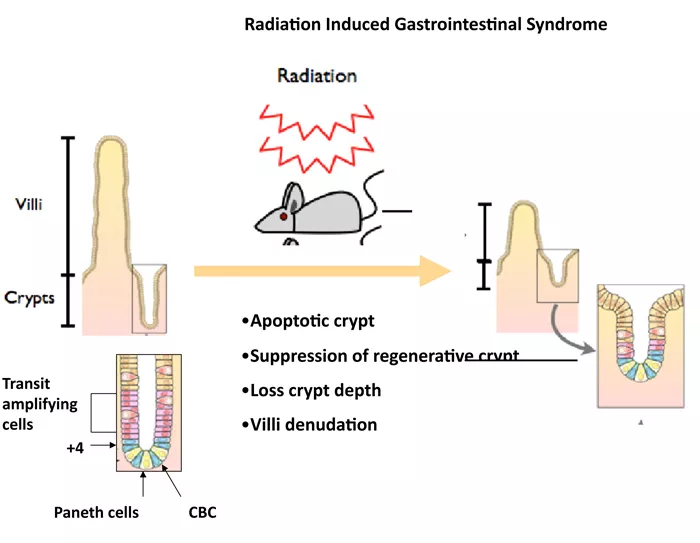Programs
The CMCR includes two main programs:
Program 1: Albert Einstein College of Medicine: Stem Cell-Based Therapies for Radiation-Induced Gastrointestinal Syndrome (RIGS)
Program 2: Oregon Health and Sciences University: Endothelial Cell Derived Factors for Radiation-Induced Bone Marrow Syndrome

Program 1
Radiation-induced gastrointestinal syndrome (RIGS) results from a combination of direct cytocidal effects on intestinal crypt and endothelial cells and subsequent loss of the mucosal barrier, resulting in electrolyte imbalance, diarrhea, weight loss, infection and mortality. Our laboratory is involved in studying the effect of intestinal stem cell growth factor R-spondin1 and transplantation of bone marrow-derived adherent stromal cells containing Endothelial Progenitor Cells (EPC), Mesenchymal Stem Cells (MSC) and myeloid/macrophages in amelioration of RIGS. Preliminary results show that transplantation of bone marrow derived adherent cell even 24 hours after lethal dose of radiation could rescue mice from RIGS and improve survival. There are currently no approved treatments to protect victims of radiological disaster.
Our objectives are to:
- find a therapeutic model that can restore and regenerate the irradiated-damaged ISC niche and provide further mitigation from RIGS;
- investigate the Radiation-induced injury signaling pathways; and
- examine if repair of the ISC niche by Toll-Like Receptor activation could mitigate RIGS.
Program 2
Preliminary data shows that mouse brain and lung-derived CD31+ve microvascular endothelial cell transplantation can rescue mice with hematopoietic syndrome even after 12Gy of whole body irradiation. The goal is to identify the pathway and signals by which vascular endothelial cells repair irradiated hematopoietic stem and progenitor cells.
One approach is to use in vitro and in vivo assays to screen for the cytokines and radio-protective factors that endothelial cells release when repairing the hematopoietic system after irradiation.
In addition, the program will perform epigenomic evaluation to identify the genes involved in the repair process of vascular endothelial cells in response to radiation induced hematopoietic sydrome against radiation.
